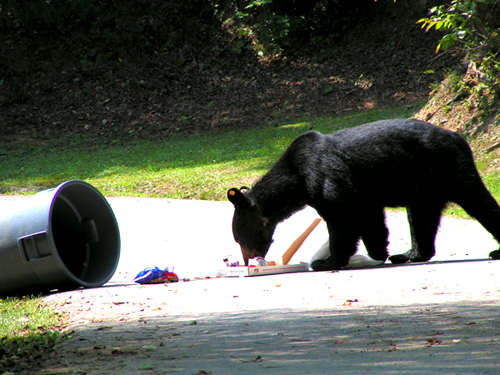By Art Lander Jr.
FRANKFORT, Ky. – When black bears emerge from their dens in eastern Kentucky, they have food and companionship on their minds.
“They haven’t eaten in three to four months,” said Steven Dobey, bear biologist for the Kentucky Department of Fish and Wildlife Resources.”After a couple of weeks they really work up an appetite.”
Bears prefer natural foods but in April and May those foods are few and far between. Bears feed on greenery and insects such as grubs until berries begin to ripen later in the summer.

Male bears do a lot of traveling, which continues throughout the breeding season in June, and increases the chances for human-bear interactions. About 70 percent of nuisance bear complaints are directly related to bears getting into somebody’s garbage.”In Kentucky, it’s illegal to feed bears intentionally or unintentionally,” said Dobey. “Feeding a bear will cause it to lose its natural fear of humans. A bear that is acclimated to people is more likely to be euthanized than relocated. Avoid making bears a nuisance. Don’t feed bears.”Landowners in bear country can take some simple precautions to prevent problems.”You have to eliminate the lure,” said Dobey.”Keep the garbage away from the house and preferably store it in a bear-resistant container.”
Food scraps, pet food, even seed in bird feeders, can attract hungry bears looking for an easy meal.
“Don’t leave garbage outside on the porch overnight. Instead, wait until the morning of the pick-up to put it outside. Avoid throwing food scraps outside to feed wildlife or pets,” said Dobey.
If camping, picnicking, hiking or fishing, food should be stored in the trunk when vehicles are left unattended. “Don’t leave it on the seat or floorboard or you risk damage to your vehicle,” said Dobey.
Adult male bears roam far and wide after they emerge from their dens.”At approximately 14 months of age, yearling bears are kicked out by the mother and go out on their own to establish a home range ,” said Dobey.”It is not uncommon for sub-adult males, which tend to roam more extensively than adults, to have home ranges greater than 70,000 acres in size.”
Reports of bear sightings and nuisance complaints are received from as far north as Greenup County and as far west as Laurel County. Complaints also generate from Kentucky’s southeastern border with West Virginia, Virginia and Tennessee.
“A majority of our bear reports come from five counties: Harlan, Letcher, Pike, McCreary, and Bell,” said Dobey.
To prevent being one of those bear reports, follow these simple precautions and keep bears in the woods where they belong.
Author Art Lander Jr. has been writing about the outdoors since the 1970s. He is a staff writer for Kentucky Afield Magazine
Media Contact: Art Lander Jr 1-800-858-1549, ext. 4414


Be the first to comment